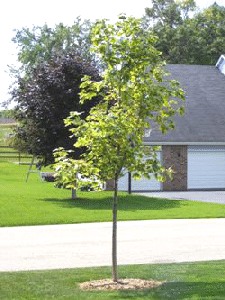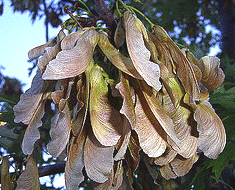Norway Maple Trees
Acer platanoides ‘Variegatum’ Variegated Norway Maple
Zones: 4-7
Full sun
Height: 50-60’
Spread: 40-50’
Shape: Upright and rounded
Growth Rate: Fast, 12-18” per year
Soil Preference: Adaptable, tolerates clay and light sand
Moisture Preference: Adaptable, tolerates drought
Foliage: Dense, green with white margins
Blooms: None or insignificant
Fruit: None or insignificant
An unusual and interesting variety of Norway Maple, it is striking as a focal point. This dense shade tree is known for its well shaped crown and straight trunk. Beautiful variegated foliage is green with white margins. Autumn leaf color is yellow tinged with pink. Norway Maples have a dense and shallow root system, making surface roots a potential problem. Wrap the trunks of young trees to prevent frost crack. May be susceptible to wind burn. Prune out non-variegated branches to preserve variegation. Fertilize once a year in early spring with slow release fertilizer.
Acer platanoides ‘Crimson King’ Crimson King Norway Maple
Zones: 3B-7
Part sun to Light Shade
Height: 35-50’
Spread: 25-30’
Shape: Rounded to oval
Growth Rate: Medium
Soil Preference: Adaptable, tolerates a wide range including alkaline, but prefers acid.
Moisture Preference: Adaptable, tolerates drought. Will not tolerate wet.
Foliage: Dense, maroon
Blooms: If present, inconspicuous yellow green and maroon flowers in early spring
Fruit: If present, 1-3” elongated brown or green hard seed pods (called samara).
Crimson King is an excellent specimen tree creating a dramatic focal point. Casts a dense shade and has a shallow root system, making it difficult to grow turf underneath, mulch widely around the tree to avoid the problem. Foliage is symmetrical with a smooth even outline. Leaves turn brown, dark maroon and/or bronze in the fall. Branching is upright with a central leader. A young Crimson King should be pruned to develop a strong tree. Prune to maintain the central leader, remove crossed and wayward branches, and thin.
Seed pods in autumn attract birds, but do not make a significant mess. It tolerates windy conditions well, but leaves will scorch if high temperatures accompany persistent wind. Water regularly and deeply to help prevent leaf scorch. Will do well as a boulevard planting between sidewalk and curb or in a sidewalk cutout (tree pit). Aphids can infest Norway Maple, and if the population is high, can cause leaf drop but should not affect the health of the tree.
Acer platanoides ‘Schwedleri’ Schwedler Norway Maple
Zones: 3-7
Full sun to part shade
Height: 40-60’
Spread: 30-60’
Shape: Upright and spreading with a rounded crown
Growth Rate: Slow to Medium
Soil Preference: Does well in some sand to some clay, tolerates poor soils. Purple leaf cultivars prefer acid soil
Moisture Preference: Well do well in moist to semi-arid. Will tolerate mild drought.
Foliage: Maroon/burgundy in spring, changing to dark green in summer, then yellow in autumn.
Blooms: Greenish yellow flowers in spring
Fruit: Double winged samaras with red wings
Schwedler Norway Maple is very popular because of its’ striking spring color. Schwedler is the “parent” of Crimson King and is a more vigorous grower than the Crimson King and more cold hardy. Schwedler is similar to Deborah Norway Maple, which was a seedling from a Schwedler discovered around 1970. Deborah is considered to have better trunk and branching development, but any other differences are slight.





